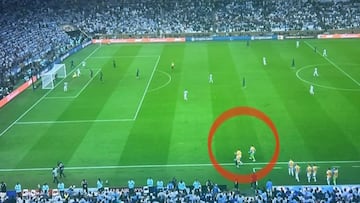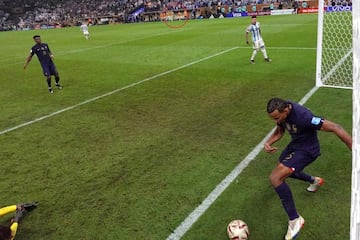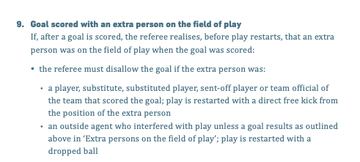WORLD CUP 2022
“Messi’s goal in extra time was illegal” - controversy in Argentina-France aftermath
The 2022 World Cup final was a classic, with Lionel Scaloni’s men prevailing after a dramatic penalty shootout, but a controversy has arisen in France.

Argentina and France came into the 2022 World Cup final with little to choose between them. Despite the South Americans dominating for much of the game, appearing to be coasting to victory, in the end their win came down to extremely fine margins. And a new image of one of those key moments has some people in France feeling aggrieved.
Did Messi’s goal infringe the rules?
A late brace from Kylian Mbappé levelled the score at 2-2 so the two teams headed into extra-time. Despite the disappointment in that ending, it was Argentina who retook the lead, with talisman Messi knocking home from close range after an incredible Hugo Lloris save. And the claims now are that it should never have stood had the rules been followed to the letter.
According to the official regulations, referee Szymon Marciniak, possibly aided by his VAR team, should have awarded a free kick to France instead of awarding the goal due to non-players being on the pitch at the time. As the new still from the game show, some members of the non-playing Albiceleste squad had entered the field of play in the excitement before the ball crossed the goal line.

With the regulations in hand, that is prohibited. Law 3, paragraph 9 of the Football Laws establishes:
If, after a goal is scored, the referee realises, before play restarts, an extra person was on the field of play when the goal was scored: the referee must disallow the goal if the extra person was:
- a player, substitute, substituted player, sent off player or team official of the team that scored the goal; play is restarted with a direct free kick from the position of the extra person

French newspaper L’Equipe was one of the first media outlets to publish this image and give their explanations about the decision.
“Minute 108 of the game, after link up with Enzo Fernández and Leo Messi, Lautaro Martínez hits hard from close range. Hugo Lloris pushes the ball back, which lands at the feet of La Pulga. Messi volleys home and makes it 3-2 for Argentina, despite Jules Koundé's late blocking attempt,” states the French publication.
“Except that the goal is invalid If we strictly apply the rules,” it continues. “When Messi volleys Hugo Lloris’ save, some emotionally charged Argentine substitutes are already on the pitch, ready to celebrate. Which is strictly prohibited.”
The general consensus is that the refereeing team did a very good job in the final, and most would likely agree that overulling Messi’s goal based on a couple of people stepping over the line over 50 yards away may have been more of an injustice to the spirit of the game.
Out of interest, some people have pointed to the paragraph immediately following this rule as a reason for the goal standing, where the following is stated:
The referee must allow the goal if the extra person was:
- a player, substitute, substituted player, sent off player or team official of the team that conceded the goal
- an outside agent who did not interfere with play
However, an ‘outside agent’ refers to other elements not including those mentioned in the first line, e.g. substitutes.








